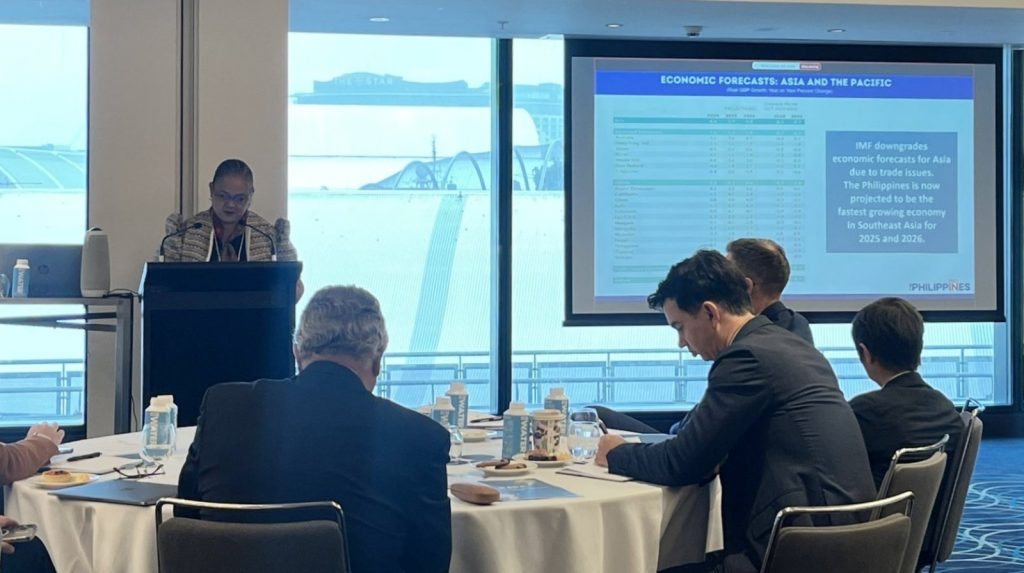The Board of Investments (BOI) joined the Commission on Higher Education (CHED) in promoting the country’s aim to elevate its role in the global education sector through the passage of Republic Act (RA) No. 11448 or the Transnational Higher Education (TNHE) Act during the Transnational Education (TNE) Opportunity Forum.
BOI Executive Director Ma. Corazon Halili-Dichosa discusses the “Philippine Opportunities in the Higher Education Sector” during the Transnational Education Opportunity Forum in Sydney, Australia on April 28, 2025.

Recognizing that globalization has rapidly transformed the landscape of education, fostering a climate of borderless teaching and learning, BOI Executive Director Ma. Corazon Halili-Dichosa emphasized the importance of the TNHE Act in addressing the growing need for accessible higher education and advanced learning technologies in the Philippines.
“This is a significant step for the BOI to present the Philippines as a strategic location for investments and partnerships in the education sector. Education is a priority of the government and thus enjoys support, including incentives and investment facilitation with a “whole-of-government” approach,” Executive Director Halili-Dichosa said in the forum, which was co-organized by the Education Center of Australia (ECA).
The TNHE Act aims to provide Filipino students access to international education and ensure the global competitiveness of higher education in the Philippines.
“Strategically located, the Philippines is within reach of major Asian capitals, thereby facilitating the mobility of students, experts, and industries within the region. The Filipinos are globally recognized for their English proficiency, and thus, foreign students and faculty do not need to learn a new language. Lastly, the country’s affordable cost of living provides higher education at a relatively lower expense, making the Philippines attractive to overseas students,” she added.
President and Chief Executive Officer (PCEO) Agnes Devanadera of Clark Development Corporation (CDC) also spoke during the forum and offered Clark as a location for prospective education cities and branch campuses of Australian universities in the Philippines.
The Forum was attended by Australia’s leading universities, such as Charles Sturt University, University of the Sunshine Coast, University of Technology Sydney, University of Canberra, Victoria University, University of New South Wales, Australian Catholic University, and University of Western Sydney.
The Philippine delegation also visited industry-linked facilities of the Australian universities. Among those visited was Flinders University’s Factory of the Future, which was built to foster relationships between manufacturing leaders and the University’s researchers and professionals to solve problems and reveal opportunities.
The factory is equipped with a range of advanced technologies, including augmented and virtual reality headsets, a range of robot welding and assembly work cells, vision systems, various sensors, precision laser scanning, upper body exoskeletons, and metal 3D printing. Located in the globally recognized Tonsley Innovation District, the facility works with several global brands such as Siemens, Sage Automation, ZEISS, Micro X, and Tesla, among others.
The Filipino delegation also visited ThincLab and the South Australian Health and Medical Research Institute (SAHMRI). ThincLab is the University of Adelaide’s business incubator facility supporting students, alumni, staff, and start-ups. It helps founders and start-ups through tailored coaching and programs from a variety of industry experts. SAHMRI also houses a comprehensive set of equipment and expertise in the areas such as medical imaging, pathology, cryogenics and animal research. Some of its facilities are available to external researchers on a per-use basis while others are available through collaboration with SAHMRI staff.
“This Mission to Australia was a milestone for BOI, as this is our first outbound activity to promote Memorandum Circular 2024-08 that included Education City and Branch Campus as preferred activities in the Strategic Investment Priority Plan (SIPP) to implement the Academe-Industry Matching Program. It aligns well with our AIM! Strategy on supporting internationalization with CHED to foster matching between local and foreign academic institutions and facilitate access to advanced technologies and knowledge. Likewise, the Mission allowed us to benchmark our facilities, initiatives, and programs with leading economies,” Executive Director Halili-Dichosa added.
As preferred activities, Education City and Branch Campus projects may be entitled to fiscal incentives under the CREATE Act, as amended by RA 12066.
In 2024, the BOI launched the AIM! Program, which is focused on developing human capital by aligning academic efforts with the current and future needs of local industries, particularly those identified under the government’s positioning strategy to make the Philippines a regional hub for globally competitive, innovative, and sustainability-driven industries.
The Program is structured around three strategic pillars. Pillar 1, K4F-PH (Kids for the Future of Philippine Industrialization), is an early-stage intervention in partnership with the Department of Education (DepEd) to raise awareness among learners about future industries and trends and encourage them toward education tracks in support of these industries. Pillar 2, TRANSCEND (Transformational Skills-based Career Enrichment and Development), aims to deliver industry-responsive skills development opportunities, highlighting opportunities for Enterprise-Based Education and Training (EBET) in collaboration with TESDA and other training institutions. Pillar 3, ELEVATE (Enhance Learning Ecosystem and Value-Adding Competencies Towards Employment), in partnership with CHED, intends to institutionalize best practices, strengthen academe-industry linkages, and cultivate highly skilled, employment-ready graduates.
CHED Chairperson J. Prospero de Vera III, in a statement, hailed the mission in furthering the Philippines’ position in the international education market, deepening cooperation with Australia, and opening the way for future partnerships in higher education.
Moreover, joining BOI, CDC and CHED are the presidents and heads of five (5) Philippine higher education institutions including Chancellor Michael Tee of University of the Philippines (UP) Manila, Maria Teresita Medado of Asia Pacific College (APC), Renato Carlos Ermita Jr. of National University (NU), Erwin Cadorna of University of Northern Philippines (UNP), and Jaime Manuel of Don Mariano Marcos Memorial State University (DMMMSU).














